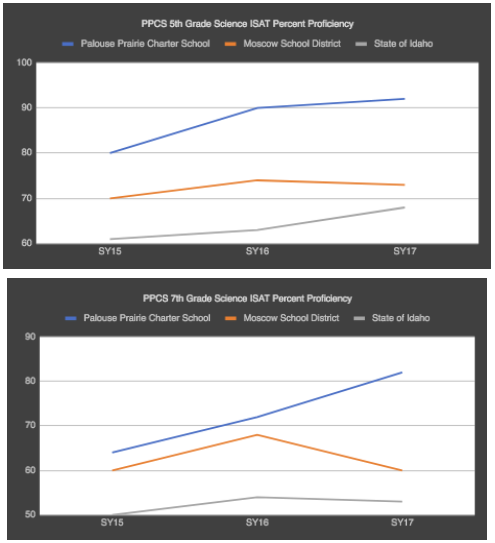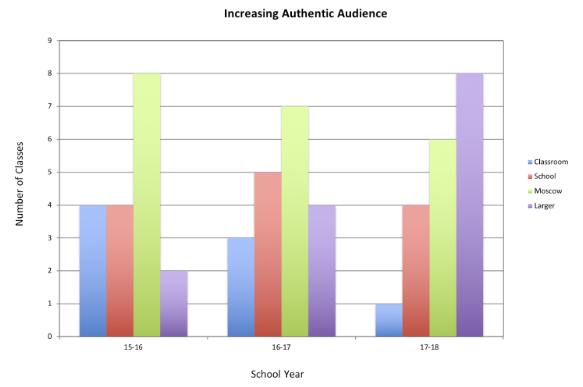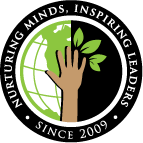PPCS Earns Credentialed Status with EL Education for exceeding the standards in Mastery of Knowledge and Skills, High Quality Work and Character. PPCS exceeds the state and district in ELA and Math ISAT assessment, while providing students with a joyful, rigorous education!
What does it mean to be an EL Credentialed School? In 2014, EL Education began recognizing schools demonstrating high levels of implementation and achievement through mastery in three areas powerfully associated with success in college and career.

To become credentialed, PPCS collected a multi-year body of evidence demonstrating how student achievement improved across each dimension of achievement. This body of evidence served as the basis for the school’s EL Education Credentialing Portfolio. This Portfolio was finalized and presented last week after PPCS met all the eligibility requirements for a credentialed school.
On October 11th, the Instructional Leadership Team and I gave a credentialing presentation to EL Education staff and audience members. We are excited to announce that we were recently informed that we have successfully become an EL Education Credentialed School! This recognition truly shows our deep commitment to the EL Education model of education.
During the presentation last week, I was filled with so much pride. I was reminded of how incredibly intentional our work is at PPCS. We displayed evidence to show that we consistently outperform our neighboring District, which is considered a high performing district, and dramatically outperform the rest of the state of Idaho. Last school year, we were ranked as the 4th highest Idaho school in ELA and the 7th highest performing school in mathematics based on our annual SBAC assessments compiled by the Idaho Ed Trends group, an Idaho education policy non-profit organization. We are currently ranked in the Top 5 Public Charter Elementary and Middle Schools in Idaho, Top 10 Best of all Public Elementary Schools in Idaho, and Top 10% of Best Charter Elementary Schools in America.
We believe this is significant because our students are able to show mastery even while we place value on, and time in, our adventure program and off campus fieldwork opportunities. Our students spend fewer days in the classroom and have a shorter school year than our neighbors. We believe that adventures and joyful learning experiences promote mastery of knowledge and skills, and our evidence supports this.



Not only are our students highly achieving in Math and ELA, students are demonstrating they have a deep understanding of science content. It is interesting to note that our students don’t demonstrate just proficiency. More than half of PPCS students demonstrate advanced knowledge.


Here is a clip of what are students are saying about themselves as scientist.


In addition to our students developing the content knowledge to be successful in college and career, they are also developing academic mindsets, becoming empathetic and compassionate people AND making positive contributions to their community and world through environmental and social justice focused projects. Here are a few examples:

The 6th grade class share with Moscow City Council recommendations of ordinances and policies that can be passed or adopted to support Moscow residents of Syringa Trailer Park.
Here is what students said after their work was presented:
“This learning has exposed me to real-life situations. Before working on the Syringa case, I didn’t know people could be thrown out of their homes onto the streets with no legal protection. I feel I showed growth by delivering an important speech to City Council.”
“This work was the most valuable work that I’ve done because we had a real impact and it was a real issue. Another reason it was so valuable to me is because it required me to dig deep into complex laws and do lots of research, which is a skill that I will need to use later in life.”
“I feel the most valuable work I did this year was presenting to the Fair and Affordable Housing Commission on the Syringa crisis. This work was important to me because we worked on a crisis that was actually happening and the work we did impacted the people of Syringa.”
Even our primary learners are making an impact on their community. During a recent expedition a group of our elementary students focused on the impacts of the expansion of the U.S. territory and population on indigenous peoples. Our students didn’t just learn about this impact from books, but more importantly from PEOPLE! The students were extremely fortunate to have many classroom and fieldwork experts teach about their own indigenous cultures and histories, including representatives of the Nez Perce, Shoshone-Bannock, Oglala Lakota, San Carlos Apache, Kalispel, and Confederated Tribes of the Colville Reservation. As part of this standards-based expedition, the fourth-grade crew built a David Thompson-style cedar plank canoe. This canoe is traditionally built incorporating both European and Indigenous forms and techniques. To read more about their project, visit EL Education’s Better World Day Projects page. One 4th grade student shared: “I learned about the past, how hard it was, and how we still ended up in peace. I learned that we can have peace even when it is hard.”
These are just a few examples of how students are using their research to make the world a better place and using local ties to push forward their understanding of social justice.

This graph shows the schoolwide increase in intentionality of including service learning within expeditions as well as the increasing inclusion of authentic audiences our students are reaching outside the school community. This focus drives student motivation and learning because they care about making the world a better place.
Not only do these expeditions have an important real world focus, the high quality of craftsmanship and complexity authentically serves the community. Our students’ work also serves as exemplary models for the EL Education’s open source collection, Models of Excellence, which serves as a resource for teachers around the world.

How is this all possible? Our incredibly high caliber staff! The following quote from a CEO of a highly successful organization epitomizes our staff. “We have a culture where we are incredibly self-critical, we don’t get comfortable with our success.” Our staff is highly collaborative, intelligent, dynamic, diverse, driven and self-critical (I prefer self-reflective). All working together towards a common goal AND always wanting to improve! They embody the concept of growth mindset and continually seek feedback from me or their colleagues to push themselves to be the best in their craft, which is always grounded in what is best for kids. This work couldn’t happen without a focus on developing a high level of relational trust and discourse as a staff. We all have a willingness to tackle crucial conversations, step in when there’s a need, support each other, lean in to the challenges of working at a small charter school and work toward providing solutions. Our team models what we expect from our students: empathetic, compassionate, critical thinkers, problem solvers, while also honoring multiple perspectives. We celebrate them all!

